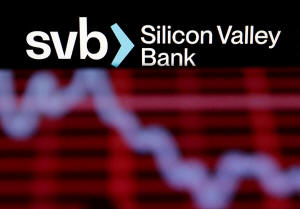SVB deal steadies banks amid credit crunch concerns
 Send a link to a friend
Send a link to a friend
 [March 27, 2023] By
Scott Murdoch, Tom Westbrook and Joice Alves [March 27, 2023] By
Scott Murdoch, Tom Westbrook and Joice Alves
(Reuters) - The sale of failed Silicon Valley Bank (SVB) to a regional
U.S. peer helped stabilise shares in European lenders on Monday, after
the sector was hammered last week by worries about systemic bank stress
and a looming credit crunch.
The sudden collapse of tech-focused SVB earlier this month triggered the
worst banking shock since the 2008 global financial crisis and drew some
of Europe's biggest lenders into investors' focus.
Signs that SVB's failure is being resolved by authorities in a smooth
manner could help underpin confidence, especially among the fragile U.S.
regional banks, whose stocks rose sharply in pre-market trade.
First Citizens BancShares Inc has bought all the loans and deposits of
SVB and gave the Federal Deposit Insurance Corp (FDIC) equity rights in
its stock worth as much as $500 million in return.
First Citizens will also have an agreement with the regulator to share
losses to provide further protection against potential credit losses.

Its shares were up 25% in pre-market trade.
The FDIC estimates SVB's failure will cost a federal deposit insurance
fund about $20 billion.
"There is relief that First Citizen Bank, one of America’s largest
family-controlled banks, has come to the rescue," said Susannah
Streeter, head of money and markets, Hargreaves Lansdown.
"A calm of sorts has descended on the banking sector but hopes that this
move will see significant stability return may be short-lived," she
added.
Banking stocks in Europe were higher on Monday after a torrid previous
session. Germany's biggest lender Deutsche Bank, which had slumped 8.5%
on Friday alongside a sharp jump in the cost of insuring its bonds
against the risk of default, rose 5.2%.
A broader index of Europe's top banks rose 1.4%, after sliding nearly 4%
in the previous session.
The First Citizens deal for SVB sealed the first weekend in several
weeks that did not bring news of fresh banking collapses, rescues or
emergency help from authorities.

BUYING TIME
The collapse of SVB and New York-based peer Signature Bank has sent U.S.
depositors fleeing smaller regional banks for larger cousins.
Bloomberg News reported U.S. authorities were in early stage
deliberation about expanding emergency lending facilities which could
give First Republic Bank more time to shore up its balance sheet.
Shares in First Republic, the future of which has been at the centre of
investors' concerns, jumped by more than 25% in pre-market trading on
Monday, with peers Western Alliance Bancorp and PacWest Bancorp climbing
5.4% and 9.2%, respectively.
[to top of second column] |

SVB (Silicon Valley Bank) logo and
decreasing stock graph are seen in this illustration taken March 19,
2023. REUTERS/Dado Ruvic/Illustration/

Major U.S. banks JPMorgan Chase & Co, Citigroup and Bank of America
advanced between 0.8% and 1.4%.
The Stoxx index of European bank shares is still down more than 17%
this month, however, and the U.S. KBW regional bank index has lost
20%, with investors on edge about what's next.
CARROTS, STICKS AND ACRONYMS
The sudden spike in tensions for banks has raised questions about
whether major central banks will continue to pursue aggressive
interest rate hikes to tamp down inflation, and whether tightened
lending will hurt the global economy.
A U.S. Federal Reserve policymaker said on Sunday that stress in the
banking sector is being closely monitored for its potential to
trigger a credit crunch, with a European Central Bank official also
flagging a possible tightening in lending.
In a credit crunch, banks restrict the amount they are willing to
lend to consumers and businesses due to heightened concerns about
their customers' ability to pay back their loans.
Some small and concentrated crunches can weigh on growth without
bringing the full economy to a standstill. Deeper lending
clamp-downs can hobble the economy for years.
Even before the present crisis erupted, bank lending to euro zone
companies had slowed for the fourth straight month in February as an
economic downturn and increased caution from lenders appeared to
take their toll.

On the upside, business morale in Germany, Europe's largest economy,
unexpectedly rose in March despite the banking turmoil.
In the United States, where flows into less risky money market funds
have risen by more than $300 billion in the past month to a record
atop $5.1 trillion, focus is on depositors' confidence.
The SVB deal may shore some of that up. First Citizens said it would
take on assets of $110 billion, deposits of $56 billion and loans of
$72 billion, and expand in California. It will share further
potential losses with the FDIC and the FDIC retains some $90 billion
in securities held for disposal.
"Effectively you're going to get a combination of carrots, sticks,
and acronyms in order to ensure you get the outcome you want and
that allows (authorities) to still use interest rates to combat
inflation," Rabobank strategist Michael Every said.
"This seems to be part and parcel of that."
(Additional reporting by Maria Ponnezhath in Bengaluru, Anirban Sen
in New Orleans and Renju Hose in Sydney; Writing by Tom Westbrook
and Toby Chopra; Editing by Jacqueline Wong, Frank Jack Daniel and
Emelia Sithole-Matarise)
[© 2023 Thomson Reuters. All rights
reserved.]
This material may not be published,
broadcast, rewritten or redistributed.
Thompson Reuters is solely responsible for this content.
 |